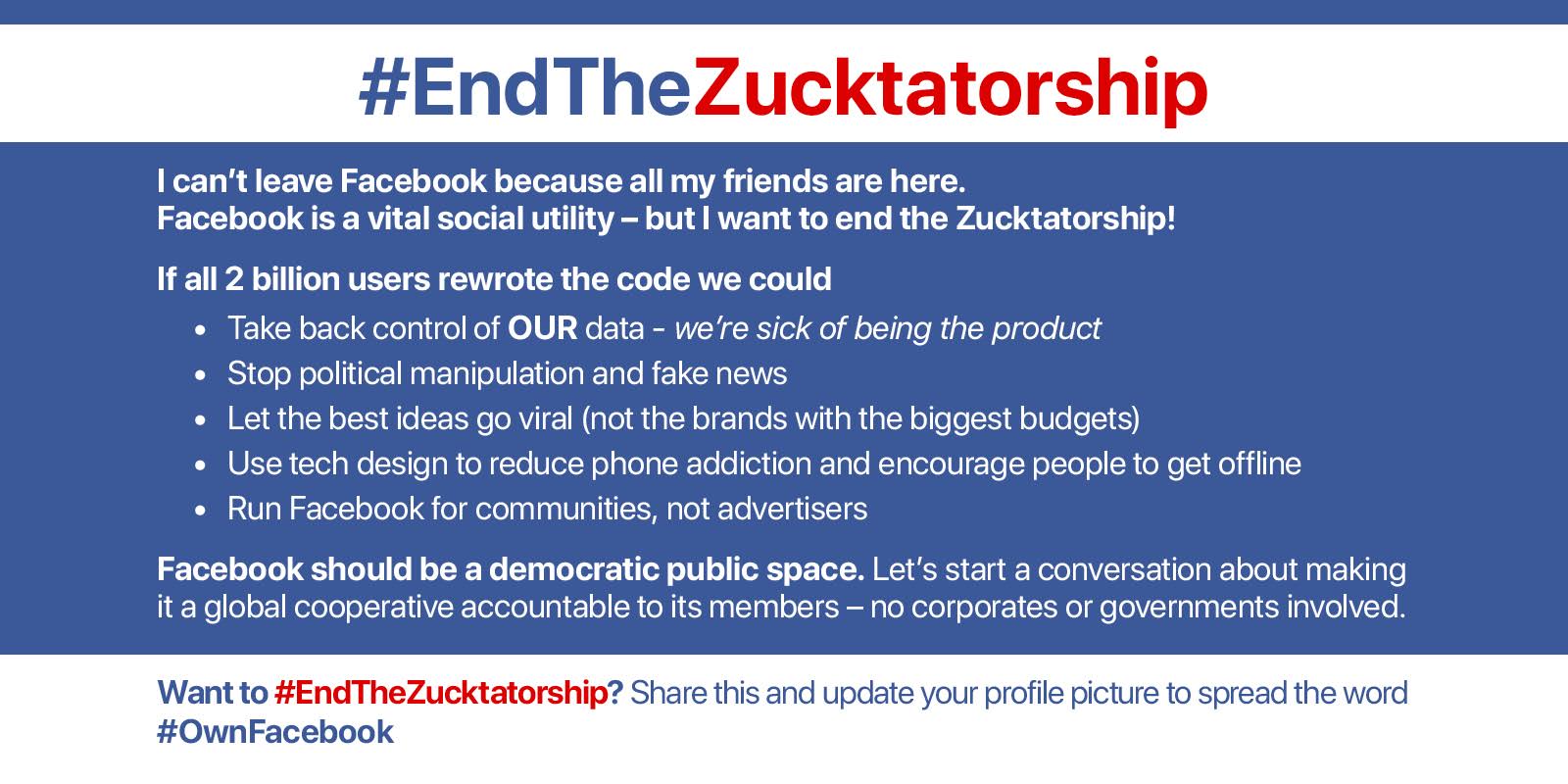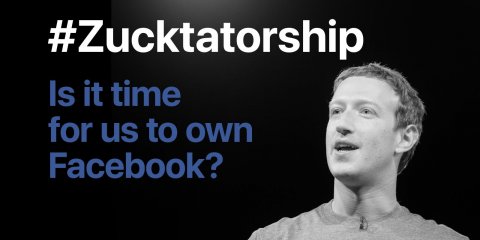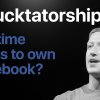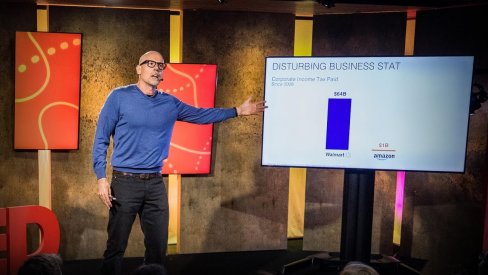We Own It founder Cat Hobbs on the Facebook data scandal.
Most of us aren’t going to #DeleteFacebook in response to the news that Cambridge Analytica has harvested the data of 50 million Facebook users to influence the US election.
It’s a huge scandal which shows how little respect Facebook has for its users, our data and privacy. But I’m definitely staying on Facebook.
I need Facebook for work, for my life, for chatting with friends and being invited to parties, for political organising and random conversations.
While deleting Facebook might sound inspiring, it feels almost impossible for most of us.
Why? Because Facebook is a natural monopoly, with ‘network effects’ in the economic jargon. That means all your friends are on there and that’s precisely why it’s valuable – to both you and the advertisers. Facebook has collected more data about people and their personalities and emotions than has ever existed and amassed it in one place. Of course you don’t want to miss out – that data is as useful to you as it is to Cambridge Analytica. You don’t want to leave because you’ll miss out on everything from event invites to cat photos, from the latest gossip to an opportunity to promote your small business.
Leaving Facebook is a bit like leaving society because Facebook is an online public space where we all gather. So what can we do about their control over our data and apparent lack of concern for our privacy?
We need to acknowledge that Facebook is now a public good, and we need to own not just our data but the whole of Facebook collectively. Facebook is
- A marketplace for ideas
- A platform where we can all hear the latest news
- A place to talk to friends and organise social events
- A place to organise politically
- A place to sell your products and services
It’s the new town square. And the thing about the town square is, it’s public infrastructure. We should all have a say over how it’s run. But we don’t.
In this online, global town square, one man controls the online lives of 2 billion people. We’re calling it the Zucktatorship.
There’s no reason why we can’t make this town square, this public good, accountable to everyone who uses it. We should all get access to the password behind Facebook and get to rewrite the code in the public interest.
And if Facebook is going to be run in the public interest, it will need to change its business model.
Is this an easy ask? No. Facebook is arguably the most powerful company and platform the world has ever seen. But let’s start talking about how we can run it differently – because change will have to happen eventually, and it should be on all of our terms.
Facebook could be run as a global, accountable cooperative, for example, and it could be funded by its members – thereby taking advertising out of its business model altogether. It wouldn’t even cost that much.
Government regulation could still apply but Facebook – and its data - would be owned and controlled by its members. The algorithm would be set in the public interest.
If we at the same time took the money out of Facebook – deciding to run it for communities rather than advertisers, it would go a long way to solving the four main problems with facebook at a stroke. We could:
1) Own our data
Data is valuable because it can be used for advertising – but if advertising with money (boosting posts instead of just letting the best posts win) isn’t an option, everyone simply competes to provide the best content. We still need absolute clarity on who owns our data and how, who has access to it, and power to remove it and control it. But misuse of data for corporate or political ends would be much less possible if advertising simply isn’t happening.
2) Stop fake news and psychological manipulation
Without access to and ability to advertise to finely tuned data sets of people, there is less ability to manipulate for commercial or political ends. But of course, in providing the best content there’s still the temptation for fake news and psychological manipulation. If we regulate Facebook collectively, we can decide where to draw the line. Where does effective communication become manipulation? We can decide.
3) Revitalise civil society on Facebook
Currently Facebook has
operating profits of nearly 50% while forcing civil society, charities, campaign groups and small businesses to pay to reach their existing fans. Publishers have already collapsed because of the new algorithm – and facebook simply says ‘leave if you don’t like it’ (but, as we’ve established, we can’t…) Facebook insists that – contrary to evidence – it has no real function as a news platform or a place for connecting with organisations but is simply a place for ‘meaningful social interactions’ (sharing photos from the latest night out). This means Facebook feeds are becoming a mixture of personal updates and adverts from big brands that can afford to pay. This is bad for users and bad for civil society. If the option of advertising was removed, Facebook would become a democratic marketplace for great ideas. Good content would go viral because people like it and want to share it, not because it's paid for.
4) Tackle our collective addiction to the internet
Facebook’s design makes us as addicted as possible in order to keep us on Facebook for the most time possible. It doesn’t have to be this way. Tech design can enable and encourage us to use time on Facebook well
(see the Centre for Humane Technology) and then get offline or do something else – instead of wanting us to keep on scrolling. But Facebook’s business model means we have to be addicted. That’s how we can be exposed to as much advertising as possible. If advertising isn’t possible, we remove the incentive for damaging, addictive tech design.
Facebook is a social utility. Unless you want to leave the online, global town square, it’s very difficult to #DeleteFacebook. But we could #OwnFacebook. We don’t have to have all the answers about how this would work. Let’s start the conversation.
If you have a problem with the #Zucktatorship, here’s what you can do:
1) Update your Facebook profile picture and cover photo with our graphics and share the #EndTheZucktatorship manifesto and video
2) Share this article by email or on twitter with the hashtag #EndTheZucktatorship
3) Talk to your friends and family in real life (!) about why we should all own Facebook, and how that might work








Comments
Dudley S replied on Permalink
I have never joined F/B. Always said it was dangerous, and now I have been proved correct.
David S replied on Permalink
Nor me Dudley! Social media does more harm than good imho!
David S replied on Permalink
Nor me Dudley! Social media does more harm than good imho!
Norman Horton replied on Permalink
I agree too much information. We managed very well without it. I wouldn't touch it with the proverbial barge pole
Roberto replied on Permalink
I too have never conversed on FB. I've watched my own family argue about photographs of their children being put on it. I think it's about time that the human species of this planet stop telling on one-another, bickering about neighbours, arguing in the street and telling lies. FB has that to answer for, I think the government should step in along with 'We Own It' and do away with the online soap opera of privacy websites. And as you stated, it has been proved correct that it is dangerous to put in peoples hands. All people are not honest. We put locks and bolts on possessions and it only keeps out the honest people. And I'm sure, as I sit here, the lock of privacy has been broken again. Another company has broken the rule of privacy! You cannot stop the capitalist and bureaucrat's dishonesty. The only way is not to succumb to the idea that FB and Twitter is only way of communicating between people. And what do I see below this page is an invitation to follow on Twitter... I give up!
Anonymous replied on Permalink
I am not on Facebook. I have always thought it unbelievable that people want to share so much information about themselves. Surely it cannot have surprised anyone that there have been breaches of data privacy! I think you have some great ideas about how to make it less noxious but I cannot see it happening, especially after the easy ride that Zuckerberg got in Congress yesterday. The poor performance of the senators has even prompted some of those misled and angry to side with him! That was unexpected.
CT replied on Permalink
I know I'm hardly someone close to this issue (or well-placed to spread the word) as I don't have an FB, twitter or YouTube account - but I do very much agree it's extremely important, and I do want to be kept up to date on your initiative.
Don replied on Permalink
I agree with points, 1, 3&4 but not two as who decides what is fake news? The liberal owned mass state media covered up any reports of social dysfunction or cultural fallout from the so called 'migrant crisis' and conspired with social media to promote liberal politics over more conservative leaning politicians.
Fake News was a political utility used by the liberal leaning establishment to censor any negative reports about the migrant crisis before moving to the elections. But we only have to look towards left leaning outlets such as CNN that keep trying to push Russian Collusion in the US which is actual fake news or the Arlan Kurdi story about the boy on the beach and a distraught father when he was actually a smuggler of people which again was fake news.
Facebook, you tube and Twitter are vastly losing readership due to the censorship of right of centre views, I think policing content is dangerous ground with many grey areas such as satire and spoofs.
Andy Hamilton replied on Permalink
*** Leveson 2 *** This was quietly dropped 3 weeks ago as our government really doesn't want to regulate the media. Fake news helps them stay in power. So point 2 is important - Leveson would give teeth to investigations into Fake News.
Julie T replied on Permalink
I am expecting that the Facebook data issue is only the tip of a very large iceberg when it comes to data harvesting and subsequent questionable uses of this data by companies like Cambridge Analytica. It seems to me, these data harvesting companies are the the real 'winners' of several major elections and referenda in recent years.
PS Can I just point out here that my browser is showing the Mollom privacy policy link as an insecure connection due to an issue with their security certificate. Someone might want to take a look at this issue.
Roberto replied on Permalink
I'm glad someone else has their eye's screwed in correctly to see breaches of security. Plus the fact that there are several invitations to send on FB and Twitter on this website. When will people learn?!!!
Hazel D replied on Permalink
I'm not on Facebook or Twitter. I'm sure Facebook isn't going to change its ways while people believe that they can't manage without it. The thing to do is to leave FB - but take your life and your friends with you. Use Facebook to contact all your friends and agree how and where you are going to keep in contact in future. Decide a date that you will all move to another platform. And do it. That's the only thing that will cause FB to clean up its act.
Peter replied on Permalink
I deleted my facebook page this afternoon, I wonder if facebook will make public how many of us have deleted their profile over this.
The worrying thing is are other social media site's doing the same. I have decided to steer clear of them all.
Christine replied on Permalink
I am not on f/b and never will be so I don’t agree that people can’t live without it.I don’t think it is possible to reform this corrupt organisation. Why don’t we start up an ethical alternative which isn’t American. Google, Twitter, Microsoft and Amazon, like Facebook all “work” for the US government and by using them we support them and keep them “alive”. As consumers we have a huge powe but most people seem to be unaware of this so perhaps your campaign should enlighten people to this power instead of proposing to reform something which in my opinion is beyond reform.
Concerned replied on Permalink
Who is "We" and how would that alternative "We" be kept from behaving the same, especially for money, in fact more so since "they" can claim to be "We"!!
Ann Dorey replied on Permalink
I have never been on Twitter or Facebook and do not wish to be.
Roy K replied on Permalink
"I have never joined F/B. Always said it was dangerous, and now I have been proved correct."
I agree totally with is.
I find the idea that it is a force for good run by an evil Zucktatorship is a rationalistion by those who really like to indulge in its tittle tattle. If you want to communicate with friends and family using digital technology, contact them by email which is relatively safe. !
John B Davies replied on Permalink
I find this all very strange. I would never dream of contacting my friends online, it just seems so weird. I talk to my friends or phone them but anything else seems unreal to me. I would never buy anything online. I imagine Facebook or Google know very little about me and IO find it very odd that people do so much online. They are missing out Online, other than for business like activities just should not happen. I would ban most online activity.
Mark replied on Permalink
Best user owned social networks to join this year:
Diaspora is one of the most popular decentralized social networks in the world. It has over one million users and relies on a group of independently owned nodes which work together to form the social network.
Diaspora’s developers refuse to bring ads to the platform or sell it to major corporations.
Interested in joining Diaspora (it's free):
Diaspora is one of the most popular decentralized social networks in the world. It has over one million users and relies on a group of independently owned nodes which work together to form the social network.
www.diasporafoundation.org
John Light replied on Permalink
T'm not on facebook and don't use it for all the self-evident reasons. I might if it were publicly owned, indeed if it can't be then it might be worth launching a publicly owned rival so that those of us who want to can communicate without giving our souls to facebook.
Nicola replied on Permalink
I am not on Facebook. I think your ideas about repurposing Facebook are very imaginative but I cannot see this happening, especially given the easy ride Zuckerberg was given in Congress yesterday. Some users who were angry at the breaches of their privacy (can this really have surprised anyone?) have sided with him because of the poor performance of those clueless senators. The law of unintended consequences!
Add new comment